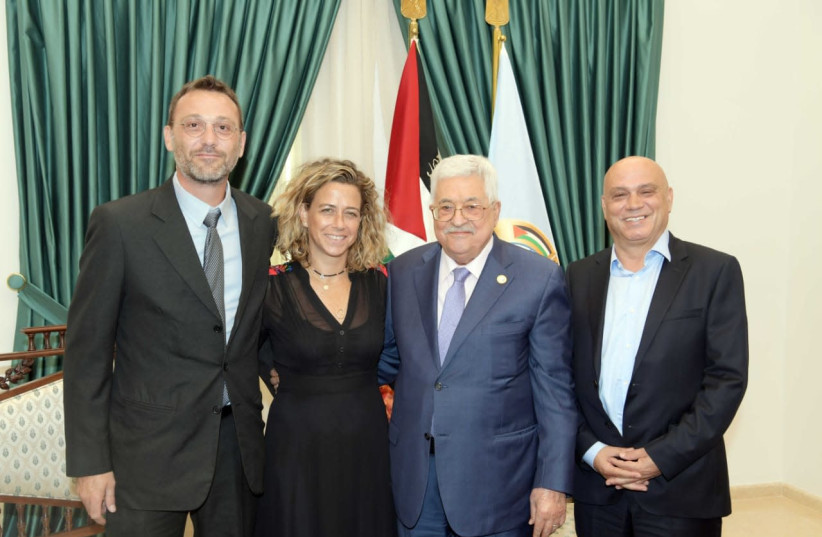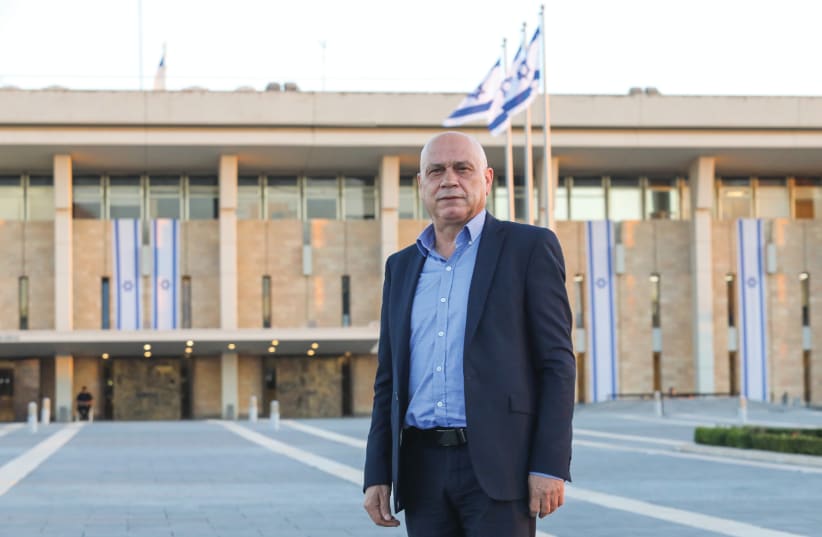‘If Israel hopes to build warm relations with Arab states beyond its borders, it must be a model of Arab-Jewish harmony within its borders,” is how Regional Cooperation Minister Esawi Frej summed up his approach this week.
Frej and Health Minister Nitzan Horowitz, both of Meretz, visited Palestinian Authority President Mahmoud Abbas in Ramallah this week. Frej ascribes great importance to that visit and bolstering ties with the Palestinians, and part of the mechanisms for doing so are under his authority at the Regional Cooperation Ministry.
But the burning issues in Israeli-Arab society, in the week in which the 100th murder of an Arab by another Arab took place, are the highest priority for Frej.
“It’s very important to me; I dedicate most of my time to it. Before I can deal with regional cooperation, I need quiet at home. If my house is burning from the inside, how can I cooperate regionally?” Frej asked during an interview in his Knesset office.
Frej hails from Kafr Kassem, which he called “the Tel Aviv of Arab society.” But there was also the 1956 Kafr Kassem massacre, in which Border Police killed 48 people, and the policemen involved in the shooting served only a year in prison. Frej’s grandfather was injured and his great-uncle killed.
“I grew up with this pain,” Frej said. “The pain led me to be a partner that believes in civil rights for Jews and Arabs, so that this will not happen again. It brought me to go hand in hand and have a shared destiny with Jews.”


But Jews, Frej said, should also recognize that their fate is tied up with that of Arabs.
“The thing that most threatens the stability of the government is not dealing with violence and crime in Arab society,” he argued.
Frej lamented the “anarchy” in Arab society, saying: “Being the strongest pays. It’s the law of the jungle.”
And while he encourages his fellow Arabs to take responsibility, he sees the government as having a central role in remedying the situation.
“We need governance and law and order, not the continued abandonment of Arab society. We are 1.7 million people who deserve personal security, and it is the country’s responsibility to give it to them, like in any normal democracy,” he said.
Frej expressed hope that this government will address the problem seriously, and said he believes that Prime Minister Naftali Bennett views it as a priority, since he took it upon himself to lead the committee to combat violence in the Arab sector. He encouraged Bennett to have more Arab experts contribute to formulating the solution, either himself or others.
As for the controversy about Shin Bet (Israel Security Agency) involvement in the government’s plans to counter the violent crime – specifically in the area of confiscating illegal weapons – Frej took a nuanced approach.
“Meretz is a party of human rights, and we’re against invasions of privacy. But as a human rights person, without personal security, without safety in my home, I can’t think about human rights. First we need security. Human rights is now a privilege for a left-wing person in Arab society,” he said.
As such, “whoever can bring me personal security in accordance with the law, I say to them, thank you,” Frej stated. “I want solutions, not slogans. I want my son to be able to walk in the street freely and go to weddings without shooting in the air, and to go to school safely. That’s my first priority. I want to be practical.”
Improving economic opportunities for Arabs will discourage crime, Frej argued: “Illegal weapons are bought with illegal money. Teachers or engineers aren’t buying the guns. Drug dealers and mafioso are. Let’s drain the swamp. Let’s attack the dark money. Let’s pool the resources of government ministries. Treat Arabs like citizens and not like a security problem.”
The lower COVID-19 vaccination rates among Arabs are a symptom of broader problems, Frej said.
“When there is anarchy across the board, there is a lack of trust, so people don’t take coronavirus seriously,” he said. “The lack of trust is why there is wild driving and fewer vaccines. Educated people get vaccinated, but not the average person.”
Frej believes a real solution for the violent crime is a holistic one, in which Arabs would be fully integrated into broader Israeli society, not just legally but economically and socially.
“The state has to decide to absorb the Arab minority into Israeli society.... I am in the government to help it make that decision,” he said. “When it decides that, the education system will change, there will be better health services and local government. Police alone cannot do that.
“I want to be Israeli, but not just as an individual; I want my collective to be Israeli. I want to be Israeli and a proud Arab, proud of my heritage, narrative and history. They don’t contradict one another. I am part of the Arab community and part of the State of Israel,” Frej added.
FREJ VIEWS regional cooperation, his ministry’s purview, as deeply connected to the internal problems Arabs are facing.
Israel should model positive Jewish-Arab relations internally, which would change how most Israelis view the region, and create better relations externally, Frej said.
“We have internal challenges, the Palestinian conflict and regional challenges. There are Arabs in all of them. You can’t escape Arabs,” he quipped. “A century ago, all the Arabs were Arabs. Only later did we say Palestinian, Syrian, etc. It was all one empire.
“If you don’t have peace with the Arabs who live with you in Jaffa, Acre, Haifa and Beersheba, how can you have peace with the Arabs outside? It all has to start here,” Frej said.
Frej dismissed metaphors of Israeli-Arabs as a bridge to the rest of the region, saying that they must be intertwined with Israelis. He gestured with his hands to show Arabs should be a link in the same chain as Jewish Israelis.
“I live this. This is my reality. We need to find solutions, not run away from them; ignoring them is running away,” he said.
THE OTHER matter Frej admonished some Israelis for trying to ignore is that of the Palestinians.
“The Meretz agenda and my agenda is very clear. We believe in a two-state solution, and we believe that there is no escaping a solution to the Palestinian-Israeli matter, as the basis of the safe, good Middle East that everyone is dreaming of,” he said. “Any attempt to escape that is like an ostrich burying its head in the sand.”
This puts Meretz at odds with Bennett and his Yamina Party, as well as others in the coalition.
But the Meretz ministers’ visit to Ramallah was “just visiting, not negotiating,” and therefore does not violate the coalition agreement, Frej said.
The message of the trip is that “we are not ignoring our Palestinian neighbors. We are leaving the two-state solution on the table. It is not a small group in Israeli society that believes in a two-state solution,” he stated.
Frej said he has differences of opinion with Abbas, but Abbas is the Palestinians’ leader, so that is who Israel needs to talk to.
When it comes to issues like the Palestinians’ petition against Israel in the International Criminal Court and its payments to convicted terrorists and their families, Frej said they “exchanged opinions,” without elaborating.
“Abbas said as clearly as possible that everything is negotiable, and we should just come and talk,” Frej stated. “Why are people afraid to talk?”
Frej reinstated the Joint Economic Committee with the Palestinians, which was part of the Paris Protocol of the Oslo Accords, and convened it for the first time in 12 years this summer. The committee is under his ministry’s authority, and Frej has taken the approach of having individual Israeli ministers meet with their Palestinian counterparts. So far, all three ministers from Meretz – Frej, Horowitz and Environmental Protection Minister Tamar Zandberg – have done so, and Economy Minister Orna Barbivai plans to, as well.
In November, there will be an Israeli-Palestinian-American conference on climate change, renewable energy and other environmental issues.
“We breathe the same air,” Frej pointed out.
“Our interest is to see a strong Palestinian Authority and see a Palestinian population in a good economic situation,” Frej said. “We are increasing the number of Palestinian workers.... We authorized sending COVID-19 vaccines to the PA.”
Frej would also like to arrange permits for more Palestinians to work in Israeli hi-tech, which is short about 15,000 workers.
This goes hand in hand with the current government’s approach to the Palestinians. Since much of the coalition supports a two-state solution, while the remaining parties do not, they have agreed not to hold peace talks. Still, Bennett has expressed support for projects to bolster the Palestinians’ economy and quality of life.
Frej believes that taking steps toward positive cooperation with the Palestinians will bring a strong foundation for an eventual two-state solution.
“Before we think about the future, which is important, we have to strengthen the present,” he said. “Economic and political peace cannot be separated.”
The Abraham Accords cannot be separated from the Palestinians, either, Frej argued, saying that peace and normalization agreements between Israel and its neighbors should include progress on the Palestinian front.
“Every agreement brings the Palestinian agreement closer. This is one big region in which everyone influences one another. Palestinians can’t stay outside it,” Frej said.
Frej seeks to “take the good things from this reality and leverage them.... The Abraham Accords will have a positive influence [with the Palestinians]. They will be part of it, today or tomorrow.... They’re not going anywhere. They’re not evaporating. They’re our neighbors.”•
